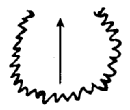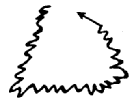题目内容
It had been a long time since I had been to Jacksonville, Florida. I had driven to town hoping to see the old barber shop where my hair had been cut as a child.
I parked my truck and decided to try and locate a telephone to see if the Florida Barber College had moved to a new location.
After walking about a block I saw an open shoe store. I walked inside and asked if I could use their telephone book. Unable to find a listing for the Barber College, I picked out the number of a local beauty salon, hoping they might tell me if the barber college was still in business. The number was busy, so I decided to wait and try again in a few minutes.
As the salesman and I stood talking the front door opened and a young man about twenty came into the store pushing himself in a wheelchair. “I need a new pair of shoes,” said the customer. As he turned the corner, there was a blanket across his lap. I was shocked to see that the young man had no legs.
“A gift for a friend?” I asked the boy. “No,” he replied. They are for me,” he continued, with a smile on his face. I just smiled back and watched to see what would happen next.
“What type of shoe would you like?” asked the clerk. “How about a pair of cowboy boots?” The man pointed to the back wall where three or four pairs of boots were displayed. The salesman, sharply turning, headed off to the backroom.
“Isn’t this fun?” the boy asked me. I moved my hand to let him know that I did not understand his question. “When I was a kid, my parents used to buy me a new pair of shoes every year. That was such a wonderful feeling. Something I have never forgotten. The smell of the leather and the pride I felt when I walked around the store showing off my new shoes.”
The salesman came walking down the aisle with a large box. He sat it down on the floor, took out one boot and handed it to the young man. The boy closed his eyes. He placed the boot against his nose, and drew in a large breath. I did not know what to say as tears began to fall on the young man’s cheeks. “What type of accident did you have?” I asked him. “Farm accident,” he said, as he tried to clear his voice.
“Do you want the cowboy boots?” the salesman asked him.
“Oh, yes!” he answered.
“I see buying a new pair of shoes still gives you that good feeling you talked about,” I told the young man, as I smiled.
“Yes it does.” he said “And I may have someone, and his feet to share it with some day.”
67. Why did the young man want to buy a new pair of shoes?
A. Because he bought a pair every year.
B. Because he wanted to send a new pair to a friend.
C. Because he hoped to keep it for memory.
D. Because he enjoyed the feeling of possessing a new pair.
68. The author writes about the barber shop at the beginning of the article in order to _______.
A. introduce the background of the story
B. see if the Barber College had moved to a new location
C. find a listing for the Barber College D. pick out a local beauty salon
69. How did the author feel when he saw a young man without legs buying a pair of shoes?
A. Unexpected. B. Proud. C. Sympathetic. D. Superior.
70. What can you conclude from the passage?
A. The young man was a stubborn person. B. The author was a man of understanding.
C. The cowboy boots were fashionable then. D. The disabled envied much those healthy.
DAAB




